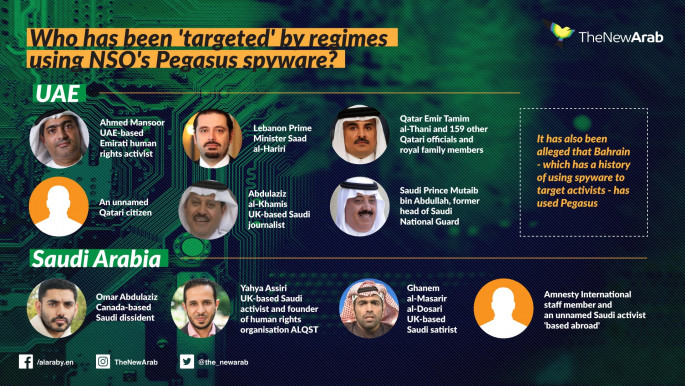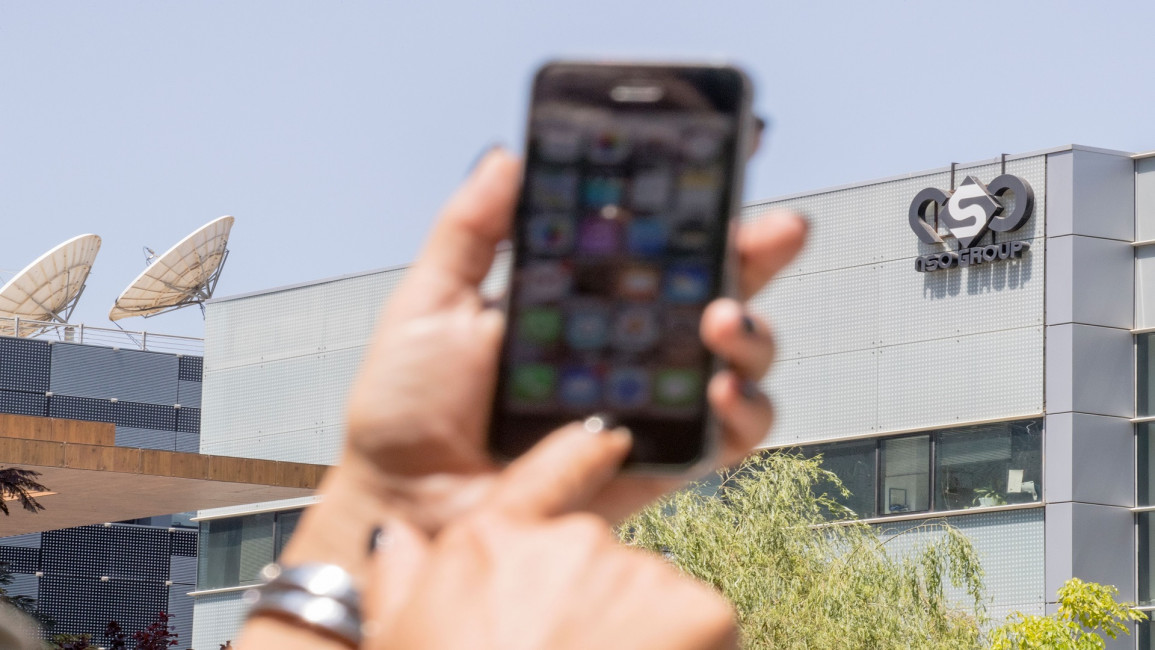Israel could hire controversial spyware firm NSO for coronavirus 'grading system'
Israel could hire controversial spyware firm NSO for coronavirus 'grading system'
Israel has also approved the use of mobile phone geolocation technology to track people who may have had contact with coronavirus patients.
3 min read
The Israeli NSO Group faces several lawsuits over its controversial spyware technology [AFP]
Israel plans to employ a controversial spyware company, which has been accused of helping authoritarian regimes hack dissidents' phones, in the fight against the novel coronavirus, Haaretz reported.
Israeli Defence Minister Naftali Bennett on Sunday published plans to fight the Covid-19 pandemic with cooperation between his ministry and private companies, without revealing further details.
Sources told Hebrew-language daily TheMarker that one of the companies in question is NSO Group.
The Israeli software company has for years fought accusations it has supplied Pegasus spyware to authoritarian governments who have used it to hack dissidents' phones.
Pegasus was allegedly used in a large-scale hack of popular messaging service WhatsApp, including Amazon chief Jeff Bezos' mobile phone.
The accusations have earned NSO lawsuits from Facebook - which owns WhatsApp - and a number of private citizens, including Saudi dissident Omar Abdulaziz.
Amnesty International has also sued Israel to see the company's export license revoked.
Israeli residents to be 'tracked and graded'
Earlier this month, Israel's internal security agency, Shin Bet, was granted special powers to use mobile phone geolocation apparatus to track people who may have come into contact with coronavirus patients.
Contact tracing is a key method in containing the spread of the highly contagious virus, but Israel has employed controversial methods used in counter-terrorism operations.
Mobile phone geolocation and other methods of contact tracing will not be enough to contain the virus' spread, Bennett said on Sunday.
The defence minister proposed a new system in which all data about coronavirus patients by the health ministry and Shin Bet is gathered and updated in real time.
The system built in collaboration with civilian tech companies like NSO would then determine how likely every Israeli resident is to be infected with the coronavirus, on a scale of one to 10.
Israeli Defence Minister Naftali Bennett on Sunday published plans to fight the Covid-19 pandemic with cooperation between his ministry and private companies, without revealing further details.
Sources told Hebrew-language daily TheMarker that one of the companies in question is NSO Group.
The Israeli software company has for years fought accusations it has supplied Pegasus spyware to authoritarian governments who have used it to hack dissidents' phones.
Pegasus was allegedly used in a large-scale hack of popular messaging service WhatsApp, including Amazon chief Jeff Bezos' mobile phone.
The accusations have earned NSO lawsuits from Facebook - which owns WhatsApp - and a number of private citizens, including Saudi dissident Omar Abdulaziz.
Amnesty International has also sued Israel to see the company's export license revoked.
Israeli residents to be 'tracked and graded'
Earlier this month, Israel's internal security agency, Shin Bet, was granted special powers to use mobile phone geolocation apparatus to track people who may have come into contact with coronavirus patients.
Contact tracing is a key method in containing the spread of the highly contagious virus, but Israel has employed controversial methods used in counter-terrorism operations.
Mobile phone geolocation and other methods of contact tracing will not be enough to contain the virus' spread, Bennett said on Sunday.
 |
| [Click to enlarge] |
The defence minister proposed a new system in which all data about coronavirus patients by the health ministry and Shin Bet is gathered and updated in real time.
The system built in collaboration with civilian tech companies like NSO would then determine how likely every Israeli resident is to be infected with the coronavirus, on a scale of one to 10.
"It could be that yesterday, my 'grade' was 5.6, but now it has jumped to 9, because I visited a grocery store that two other carriers had visited in recent days," Bennett explained in Sunday's plan.
The system is already built and ready to use pending legal approval, Bennett said.
If given legal approval and "appropriate controls to protect people's privacy", the system would then be continuously fed with data.
"At any given moment, we'll summon the people with the highest likelihood of infection for testing," the plan explained.
Read more: Israeli firm may have helped Saudis hack Jeff Bezos' phone, UN experts say
Earlier this month, Bloomberg reported that NSO had developed a product similar to that described in Bennett's plan.
A person familiar with the matter said the product analyses vast amounts of data to map people's movements and track who they come into contact with. It is currenly being tested by around a dozen countries.
The software takes two weeks of tracking data from a coronavirus patient's mobile phone and then matches it with location data collected by national operators to determine who was in the patient's vacinity for more than 15 minutes, the person said.
The company has denied the product is intended for use within Israel.
Follow us on Facebook, Twitter and Instagram to stay connected
If given legal approval and "appropriate controls to protect people's privacy", the system would then be continuously fed with data.
"At any given moment, we'll summon the people with the highest likelihood of infection for testing," the plan explained.
Read more: Israeli firm may have helped Saudis hack Jeff Bezos' phone, UN experts say
Earlier this month, Bloomberg reported that NSO had developed a product similar to that described in Bennett's plan.
A person familiar with the matter said the product analyses vast amounts of data to map people's movements and track who they come into contact with. It is currenly being tested by around a dozen countries.
The software takes two weeks of tracking data from a coronavirus patient's mobile phone and then matches it with location data collected by national operators to determine who was in the patient's vacinity for more than 15 minutes, the person said.
The company has denied the product is intended for use within Israel.
Follow us on Facebook, Twitter and Instagram to stay connected


![Minnesota Tim Walz is working to court Muslim voters. [Getty]](/sites/default/files/styles/image_684x385/public/2169747529.jpeg?h=a5f2f23a&itok=b63Wif2V)




![Debris near Rafic Hariri International Airport [Getty]](/sites/default/files/styles/image_330x185/public/2176162423.jpeg?h=a5f2f23a&itok=MCSK9mkM)
![An Israeli air strike on Jabalia killed teenage journalist Hassan Hamad [Screengrab/X]](/sites/default/files/styles/image_212x120/public/2024-10/hassan%20hamad1.jpg?h=c12e0b96&itok=KstD_5xk)
